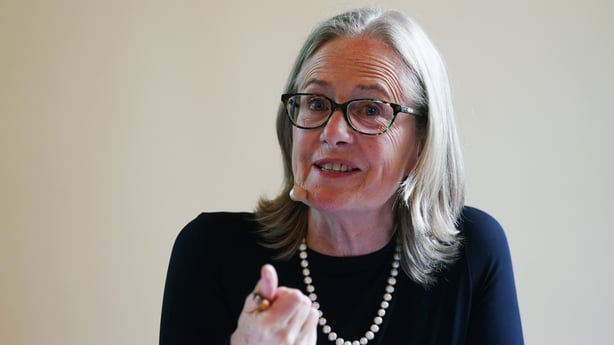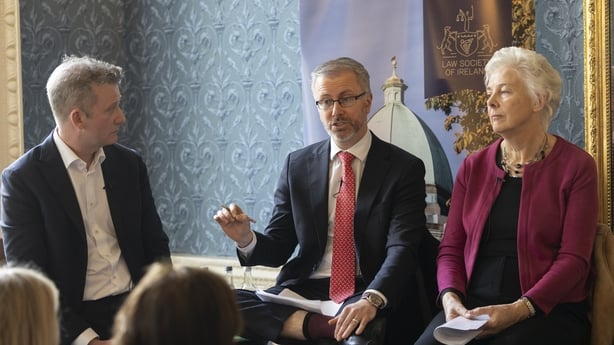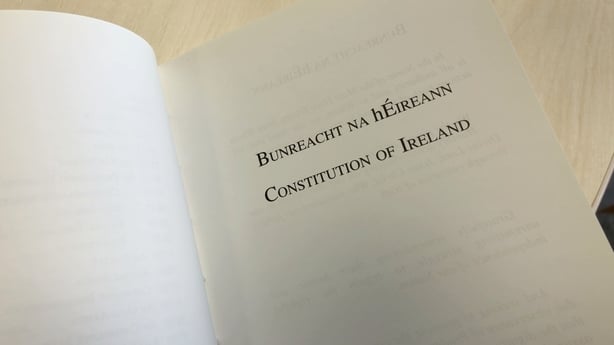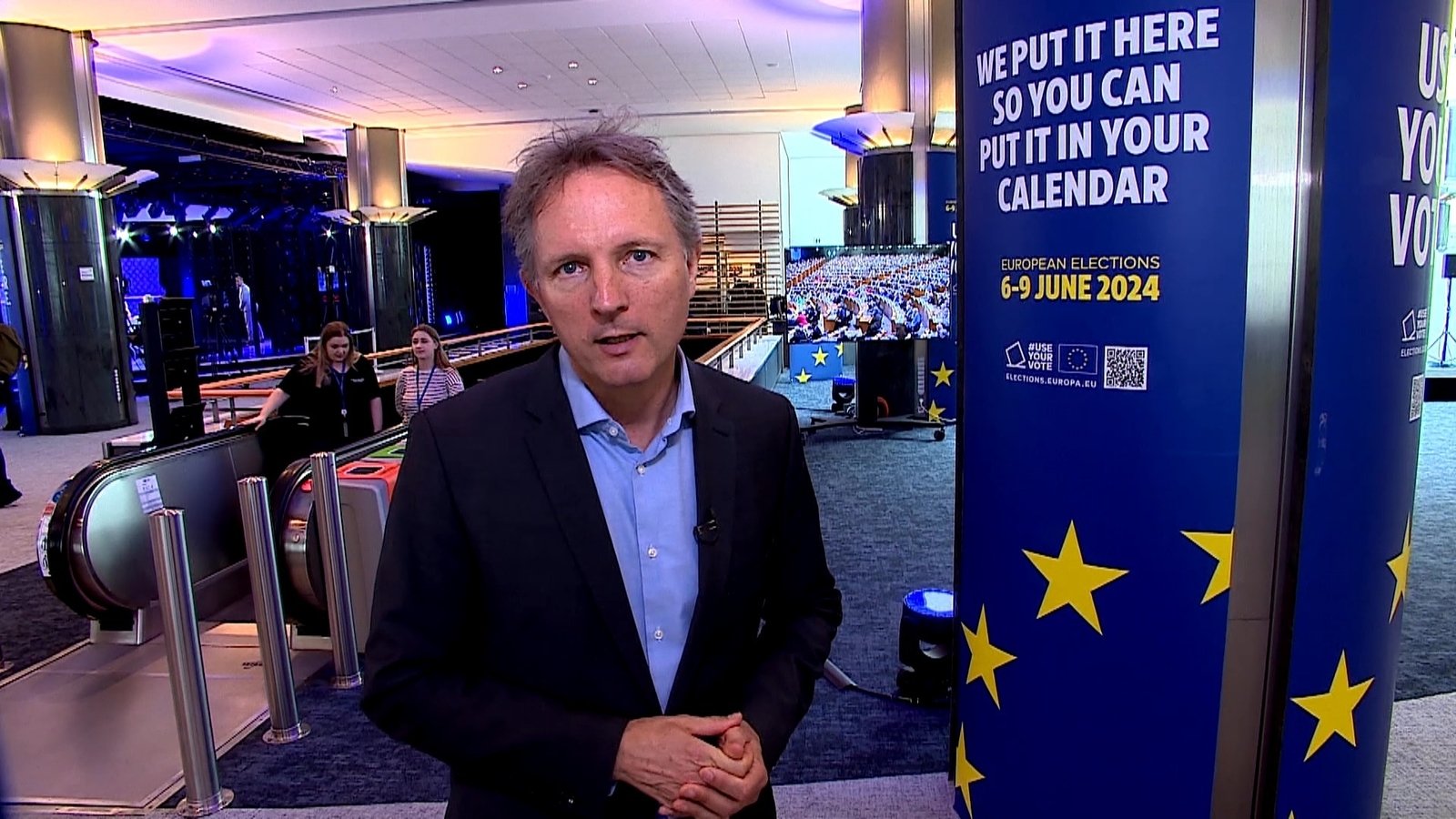Countdown to polling on 8 March twin referendums

This day next week it will be known whether or not the Irish people have decided to make further changes to the Constitution after what will be voters’ first opportunity to cast a ballot in more than four years.
The twin referendums – on the issues of Family and Care – will follow campaigns that have been complicated, at times directionless and which didn’t fall neatly along ideological lines.
Without readily available, tangible, or easy-to-explain outcomes, one of the biggest challenges has been getting people engaged. One of the most common questions being asked, a Government TD noted grimly, was why are the referendums happening at all?
Nonetheless, as voting day draws near, minds are beginning to focus. As the independent chair of the electoral commission, Ms Justice Marie Baker – who has run an energetic and engaging independent information campaign – put it, people don’t take referendums lightly.
“People realise that it is complex but also that it is important. Because what is at issue is the fundamental rights part of the Constitution and when people hear that they start thinking ‘Oh yes’ because rights matter!”
And they have a lot to contemplate between now and next Friday, 8 March.

The questions, which had their origins in an intention by many governments to change the so-called ‘women in the home clause’ of the Constitution, have turned into something much wider than that, encompassing concerns around care, disability, taxation and the most Irish question of all: who might inherit the family farm?
Before we get to all that, here’s a reminder of exactly what it is people will be voting on.
The Family Referendum
The Family Referendum will be on white paper. Voters will be asked to vote ‘Yes’ or ‘No’ on whether they want to approve the 39th amendment to the Constitution.
That would mean amending Article 41.1 which says that “the State recognises the Family as the natural, primary and fundamental unit group of Society, and as a moral institution possessing inalienable and imprescriptible rights, antecedent and superior to all positive law” to insert the words, after family, “whether founded on marriage or on other durable relationships”.
A ‘Yes’ Vote would also alter Article 41.3.1 which says that “the State pledges itself to guard with special care the institution of marriage” to remove the following words “on which the family is founded”.
The Care Referendum
The Care referendum will be on green paper. In it, voters will be asked to Vote ‘Yes’ or ‘No’ on whether to approve the 40th amendment to the Constitution. This would Article 41.2 and replace it with Article 42B.
So, it would delete Article 41.2.1 which says “the State recognises that by her life within the home, woman gives to the State a support without which the common good cannot be achieved” and Article 41.2.2 which says that the State “shall endeavour to ensure that mothers shall not be obliged by economic necessity to engage in labour to the neglect of their duties in the home”.
A ‘Yes’ vote would replace these with the new Article 42B which would say the State “recognises that the provision of care, by members of a family to one another by reason of the bonds that exist among them, gives to society a support without which the common good cannot be achieved, and shall strive to support such provision”.

Where Did These Questions Come From?
The wording on both referendums has been criticised – in the case of the Family referendum for being ambiguous and unclear, and in the case of the Care referendum for not going far enough. So how did the Government come up with it?
The issue of removing the “gendered language” linking women to the home was first considered by the Constitutional Convention, which recommended in 2013 that it be replaced with something more gender neutral which recognised the importance of care.
The issue fell into the background while the referendums on marriage equality and repealing the eighth amendment took place. It was again revisited by the Citizens’ Assembly on Gender Equality which in 2021, recommended three referendums. The first, to make a specific reference in the Constitution to gender equality, the second to widen the definition of family, and thirdly to replace the reference to women in the home with gender neutral language while taking reasonable measures to support care within the home and wider community.
Fearing a divisive debate around gender, the Government approached these referendums cautiously, with many delays to its Programme for Government commitment to hold referendums. Following long drawn out (and behind closed doors) deliberation on the wording, it ultimately decided not to hold the first proposed referendum (on gender equality) claiming such a change could elevate one category of discrimination above another.
On 5 December 2023 it announced the wording of the Care and Family referendums, with the decision to include care within families and not the wider community an immediate source of disappointment to civil society groups and opposition parties.
There was further controversy around the Government’s decision to waive pre-legislative scrutiny by the Oireachtas in an effort to fasttrack the process and hold the votes by International Women’s Day.
All this amounted to campaigns getting off on a bad footing.
The Care Campaign
Civil society groups – whose role was central to the passing of both the Repeal and Marriage Equality referendums – were slow to give their stamp of approval. The National Women’s Council, which had concerns that the care wording did not go far enough, came on board. In another big boost to the coalition, Family Carers Ireland also came out in favour of a ‘Yes Yes’ vote. It had hoped the wording would go further but said it was a good start in recognising the “invisible work” of family carers, for the first time in the Constitution.
Taoiseach, Leo Varadkar, said it is about playing constitutional catchup: “It was written in 1937, mainly by men born in the 1800s and the wording about women’s life in the home and mothers’ duties in the home is out of date,” he said.
But while few disagreed with removing the provision, the question of what exactly to replace it with has proven controversial. The Free Legal Advice Centre (FLAC) published a legal opinion, saying it was “unlikely” the care amendment would provide carers, people with disabilities or older people with any new rights. It said it was “regrettable that voters do not have the choice to simply delete the current so-called women in the home provision, which is ineffective, sexist and offensive.”
In a double blow to the ‘Yes’ campaign, this was followed by a statement from the Irish Council for Civil Liberties (ICCL) which said that the proposed text on care “would not provide meaningful legal protection to any person who gives or receives care.”
Another campaign group was launched, Equality Not Care, arguing that the Care amendment was patronising, ableist and ageist. They said it perpetuates the notion that people with impairments are burdens on their families, overlooking their rights to have independent lives.

The same argument had been made from the outset by Independent Senator Tom Clonan, who believes the wording in the proposed article 42B gives constitutional express to the “conservative ideological position that the primary responsibility for care resides within the family and family members.” He said this proposed Article is not rights-based and is worded to indemnify the State and the HSE from any legal obligations to support family carers.
The Government’s main counterargument to this is that the Amendment will compel it to do better on disability and care.
Minister for Disability Roderic O’Gorman said a ‘Yes’ vote would strengthen his hand in securing funding for disability services in the next Budget, and strengthen the hand of citizens in bringing the State to court.
“It will be relevant to negotiations around the Budget and ultimately I have no doubt it will be interpreted by the Supreme Court in cases where individuals – Irish citizens – who feel that the Government of the day isn’t doing enough to support their care,” he said.
More recently in the campaign when it became clear that the issue of disability was becoming a significant part of the debate, the Minister said there would be a “very good case for a disability amendment to our constitution” in the future. To this, the Social Democrats leader Holly Cairns, who is calling for ‘Yes Yes’ votes, said she “nearly fell off her chair” arguing the Government can do an awful lot more to support people with disability services without holding a vote.
Labour Party leader, Ivana Bacik, said she is calling for a “Yes Yes And” vote, meaning that if the amendments are passed then the process of far greater reform in both gender equality and recognising care will be needed.
Sinn Féin’s position can be described as “Yes Yes But”. It’s leader, Mary Lou McDonald, said the proposed Care amendment would be a “positive step forward” but that it’s “not the comprehensive, copper-fastened recognition of care” that is needed.
“So yes, we had to weigh that up. In the end we decided not to allow the perfect be the enemy of the good,” she said, adding that they would re-run the referendum, with stronger wording if it was rejected and the party was elected to Government.
The Family Amendment Campaign
The Government’s case is that there are over a million people in Ireland living in families that are not based on marriage, and that it’s past time the Constitution was updated to reflect that.
The Fianna Fáil leader Micheál Martin said the amendment would capture a wide range of families such as couples with or without children, single parents and grandparents raising children. “The current wording of the Constitution needs to change if we are to show all families the respect which they deserve,” he said.
But the ambiguity around the term “durable relationship” has overshadowed that argument and made it a far more complicated case to present to voters. The confusion was not helped by the interjection by Mr O’Gorman, who told the Dáil that “throuples” would not be included in durable relationships.
An effort earlier on in the debate to suggest that this term would increase migration by giving those in durable relationships family reunification rights, was knocked on the head. The Government argued the Oireachtas will retain the right to distinguish between married and unmarried people in legislation governing migration, and that it is dealt with in European law.
But Senator Michael McDowell and his group, Lawyers for No, argue that a person could seek to resist deportation on the grounds of a durable relationship – if this Amendment is passed.
The Government argues that the Amendment would have no implication for succession rights which it says are set out in various pieces of legislation. These laws and not the Constitution, it says, is where rights to inherit property are conferred. However, Lawyers for No claim that the State would have “significant difficulties” in maintaining that families not based on marriage “can be entirely deprived of rights” under the Succession Act – if this amendment is passed.
In a sign that concerns are being relayed to Government from the local councillors of its main parties, Mr O’Gorman last week requested to meet the ICMSA which has expressed “serious misgivings” that people are being asked to vote “blind” on how a durable relationship might be interpreted.
Farm families are worried that someone – who previously had a relationship with the diseased- could make a claim on the land. The meeting with the Minister failed to allay their concerns. ICMSA President Denis Drennan said the Government must give a “clear commitment that current relationships recognised by the State will be in no way undermined” by the amendment.
Meanwhile, the Irish Catholic Bishops spoke out against both amendments. In a statement read out at all masses last Sunday, they said the proposed Family Amendment “diminishes the unique importance of the relationship between marriage and family in the eyes of society and State and is likely to lead to a weakening of the incentive for young people to marry”.
They said the family “based on the exclusive, lifelong and life-giving public commitment of marriage, is the foundational cell of society and essential to the common good.”
Former president Mary McAleese said an endorsement of the Family Amendment would mean that “so many families whose lived lives enhance our communities and our country but are not based on marriage will see in our revised Constitution the respect they have always deserved and the recognition they have earned, but which is absent deliberately absent, from the Constitution as currently worded.”
Seeking to invoke the energy of the marriage equality and repeal referendums, she said leaving the two Articles as they are would “contradict the dynamic of a people who cared enough to vote overwhelmingly” in both those referendums.
But it is clear to anyone involved in either side of the current debates that these twin referendums have nothing of the energy, the grassroots engagement or the clear message of either of those earlier votes.
For a coalition that might have expected the sort of feel-good bounce from holding these votes on international Women’s Day, there is nervousness that they could instead deliver a badly timed blow.

How Likely Are They To Pass?
The limited polling so far suggests that both will pass. The most recent, in last Sunday’s Business Post, suggests that 52% would support the Family amendment, 22% would reject it while 20% said they did not know and 5% said they will not vote.
On the Care Amendment, 56% said they would support it, 20% said they would not, and 19% did not know.
But there are many caveats that go with that, not least that it was carried out two weeks before polling.
A similar Red C Poll by the same newspaper one week out from the 2013 referendum to abolish the Seanad, suggested it would pass – with 44% saying they would vote ‘Yes’, 27% would vote ‘No’ and 21% undecided. The undecideds swung the vote to a defeat, or what then taoiseach Enda Kenny described at the time as a “wallop” for his government.
There has been what is described as the “status quo effect” apparent in other recent referendums where those who are not decided end up voting to leave things as they are. If this trend repeats itself in the case of the Family and Care referendums – and it is likely given the uncertainties raised – then the result will be closer than polls are suggesting.
Turnout will also be a factor. Analysis by the ESRI last year found that a one percentage point increase in turnout is associated with a 1.6 percentage point increase in support for a progressively liberal social policy.
Political Scientist at University College Cork, Dr Theresa Reidy, also says turnout will play a part.
“When we are talking about turnout it’s really about who is more motivated to go out and vote. For a long time it was felt some of the ‘No’ voters, conservative voters, were more motivated,” she said.
“But there is definitely a broad liberal turn to the electorate. Two-thirds of the electorate now have liberal views and liberal values. So, if it goes really low that will favour the No’s. But if you go above 30% and approaching 40 – it will probably be more finely balanced,” she said.
As we enter the final few days of the campaign, nobody is taking anything for granted.
More:
Electoral Commission chair answers referendum questions
Referendums: Q&A with The Electoral Commission
Watch: Referendums on family and care explained
Explained: What will people vote on in twin referendums?





